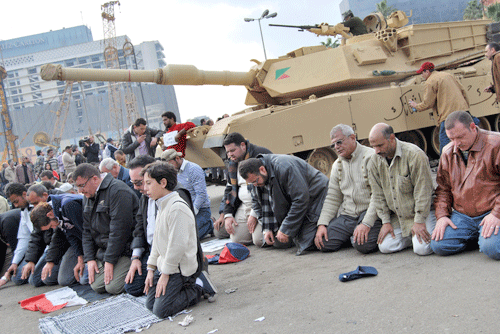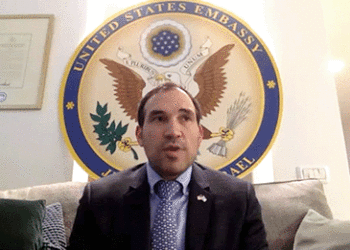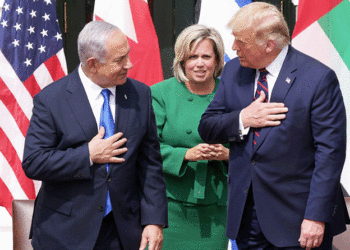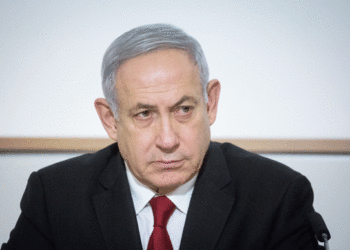By RON KAMPEAS
WASHINGTON (JTA) — The consensus on U.S. assistance to Egypt is that it has delivered bang for its buck: The $1.3 billion in annual defense aid has stabilized a key ally and strengthened America’s profile in the Middle East.
But in the wake of massive unrest that could unseat Egypt’s autocratic leader, the question now emerging is whether sustaining the aid to the current regime would advance a democratic agenda or squelch it — or whether that should be an American concern at all.

The Obama administration, speaking after the outbreak of the protests, initially said it would “review assistance” to Egypt. But now the White House seems to be quietly backtracking as long as Egyptian President Hosni Mubarak’s regime transitions toward greater democratic freedoms.
It is a debate that pro-Israel groups will be watching closely.
Assistance to Egypt is rooted in the 1979 Israel-Egypt peace deal and has become a cornerstone of preserving the quiet along Israel’s southern flank. The question that Israel and its allies in Washington will be considering as the Egyptians shape a new government is whether continuing such assistance sustains the peace treaty or bolsters its detractors, chief among them Egypt’s Muslim Brotherhood.
In a paper anticipating such considerations, the Congressional Research Service said last week that the day might finally have come to recalibrate assistance to Egypt, which for more than 30 years has gone mostly to the military.
“The unrest of January 2011 suggests that the terms of recent debate over U.S. assistance to Egypt may change significantly in the coming months,” the paper said. “Although U.S. assistance has helped cement what many deem to be a successful 30-year Israel-Egypt peace treaty, as time has passed, critics of continued U.S. assistance to Egypt have grown more vocal in arguing that U.S. aid props up a repressive dictatorship and that, to the extent that any U.S. funds are provided, policymakers should channel them toward supporting opposition or civil society groups.”
The problem with that formulation, said Graham Bannerman, who for years lobbied for U.S. assistance to Egypt, is that it ignores how deeply woven the military is into Egyptian life.
“They are the ultimate preserver of life and stability,” he said, noting the army’s role in calming protests in recent days and separating antagonists.
Egypt’s access to U.S. hardware and training elevates its profile as an Arab leader — a status that Egyptians of all political and social stripes embrace, Bannerman said.
“The army has a role in the region; a competent military force improves your political standing,” he said. Forcing Egyptians to replace democracy with military assistance is “like the Boy Scout walking the old lady across the street when she doesn’t want to so he can get a merit badge.”
According to the Congressional Research Service report, the $1.3 billion in U.S. aid to Egypt is split into three categories: acquisitions, upgrades to existing equipment and follow-on support/maintenance contracts. The U.S. money accounts for as much as 80 percent of Egypt’s procurement power, CRS estimates. Bannerman said that translates into major acquisitions such as aircraft, tanks and ships, as well as training.
As upgrades and support become more and more expensive, and the $1.3 billion remains stagnant, that effectively means aid to Egypt is shrinking, CRS notes. By contrast, military aid to Israel — scheduled to reach $3 billion this year — rises commensurate with cost increases.
The assistance to Egypt, along with years of training by and alongside U.S. forces, has created a military loyal to U.S. interests, analysts say. For U.S. forces, Egypt waives the restrictions on traveling the Suez Canal that are imposed on other nations. Without Suez access, the United States might otherwise have to double its naval presence around Africa, Bannerman said.
The Congressional Research Service report points out such benefits.
“The U.S. Navy, which sends an average of a dozen ships through the Suez Canal per month, receives expedited processing for nuclear warships to pass through the Canal, a valued service that can normally take weeks otherwise required for other foreign navies,” it said. “Egypt also provides over-flight rights to U.S. aircraft.”
The signature U.S. military assistance to Egypt is the co-production of the Abrams tank in Egypt, in place since 1988. Some parts are manufactured on the outskirts of Cairo, and the product is assembled there. Egypt plans to buy a total of 1,200 tanks, CRS says.
The program, combining defense spending with jobs creation in Egypt, is typical of how the Egyptian army functions — not just as a defense force but as a major property owner and public employer.
Robert Springborg, an Egypt expert at the U.S. Naval Postgraduate School in Monterey, Calif., told National Public Radio this week that the Egyptian army has its hands in manufacturing automobiles, building infrastructure, clothing, kitchen appliances, tourism and a range of other areas.
U.S. money does not fund such ventures but helps facilitate them.
The pervasiveness of the military in Egyptian life has net positives and negatives, according to U.S. diplomats. A 2008 memo from the U.S. Embassy in Egypt notes that “the military still remains a potent political and economic force,” and praises its role in producing bread to meet shortages and “sometimes can successfully step in where other government agencies fail,” which ensures stability.
It also said, however, that the military’s power has diminished in recent years, rendering it vulnerable to corrupt overtures of co-option by Gamal Mubarak, the Egyptian president’s son and until last month his designated heir.
That complex interface and a natural American tendency to kick against militarized societies in the past have led to congressional efforts to move funds from military assistance to democratization.
In 2008, Rep. David Obey, D-Wis., then the chairman of the Appropriations Committee of the U.S. House of Representatives, led the passage of such a law, but the Bush and Obama administrations have waived it.
Rep. Ileana Ros-Lehtinen, R-Fla., another advocate of moving military assistance earmarks to democracy development, is now in a position of influence. As the newly installed chairwoman of the House Foreign Affairs Committee, she scheduled two days of hearings this week on assistance to Egypt and Lebanon.
Ros-Lehtinen once was an advocate of moving funds to democratization.
It is “incumbent upon us to assess United States aid to Egypt, and find effective solutions to resolving the freedom deficit there while providing for our security priorities and ensuring regional stability,” she said at a 2006 hearing.
Now, watching the developments unfold, Ros-Lehtinen has yet to say where she stands on military assistance, but she has suggested its continuance depends on a government dedicated to bottom-line U.S. agenda items, including support for Israel.
Last week, she said that “Opposition leaders must categorically reject the involvement of extremist elements who are trying to use this crisis to gain power, hijack Egypt’s future, and seriously damage Egypt’s relationship with the United States, Israel and others.”



















